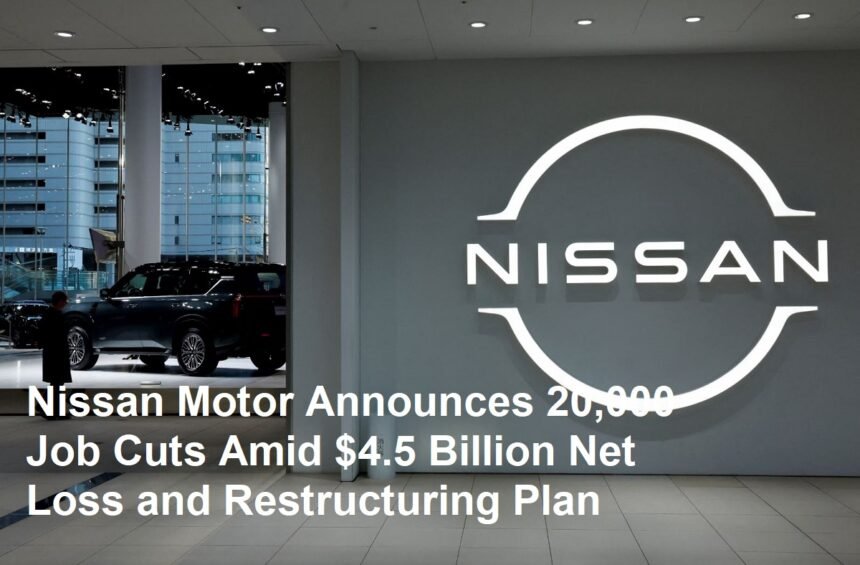Nissan Motor Company, one of the world’s leading automobile manufacturers, has recently announced a significant restructuring plan in response to its financial challenges. The company reported a staggering net loss of approximately $4.5 billion (670.9 billion yen) for the fiscal year ending March 2025, marking one of the largest annual losses in its history. In light of this financial setback, Nissan plans to reduce its global workforce by about 20,000 employees, which represents roughly 15% of its total staff. This move is part of a broader strategy aimed at streamlining operations, cutting costs, and returning the company to profitability by fiscal year 2026.
The roots of Nissan’s financial difficulties are multifaceted. The company has faced a combination of declining sales, rising production costs, and the ongoing challenges of adapting to a rapidly changing automotive industry. The global shift toward electric vehicles, supply chain disruptions, and economic uncertainties have all contributed to Nissan’s struggles. Additionally, restructuring costs and impairment charges have further weighed on the company’s financial performance, culminating in the reported net loss.
The planned workforce reduction is a key component of Nissan’s recovery plan, which also includes consolidating its manufacturing footprint. The company intends to reduce the number of its auto plants from 17 to 10, focusing on creating a leaner and more resilient business model. This consolidation aims to improve operational efficiency, reduce overhead costs, and better align production capacity with market demand. By streamlining its manufacturing operations, Nissan hopes to enhance its competitiveness in an increasingly challenging global market.
It is important to note that the 20,000 job cuts include approximately 9,000 layoffs that were announced in the previous year. The additional reductions will be implemented gradually, with the goal of completing the workforce downsizing by March 2028. This phased approach is designed to minimize disruption and allow the company to manage the transition effectively while maintaining essential operations.
Nissan’s leadership has emphasized that these decisive and bold actions are necessary to adapt quickly to market changes and secure the company’s long-term viability. The company’s executives have expressed a strong commitment to working collaboratively with employees, stakeholders, and partners to implement the recovery plan successfully. The ultimate objective is to restore Nissan’s profitability and position it for sustainable growth in the future.
The impact of such a large-scale workforce reduction is significant, both for the employees affected and for the communities where Nissan operates. Job losses on this scale can have profound social and economic consequences, including increased unemployment and reduced local economic activity. Nissan has indicated that it will provide support to impacted employees, including severance packages and assistance with job placement, to help ease the transition.
From a broader perspective, Nissan’s situation reflects the challenges faced by many traditional automakers as they navigate a period of profound transformation. The automotive industry is undergoing rapid technological change, with increasing emphasis on electric vehicles, autonomous driving, and digital connectivity. Companies must invest heavily in research and development while managing costs and responding to shifting consumer preferences. For Nissan, the current restructuring is a critical step toward aligning its business with these new realities.
The company’s financial losses and workforce reductions also highlight the competitive pressures within the global automotive market. Nissan competes with other major manufacturers that are aggressively expanding their electric vehicle offerings and investing in innovative technologies. To remain competitive, Nissan must not only reduce costs but also accelerate its product development and market responsiveness.
Looking ahead, Nissan’s recovery plan includes a focus on innovation and sustainability. The company aims to expand its electric vehicle lineup, improve fuel efficiency, and enhance its environmental performance. These initiatives are expected to play a central role in Nissan’s strategy to regain market share and meet increasingly stringent regulatory requirements worldwide.
In conclusion, Nissan Motor’s announcement of a $4.5 billion net loss and plans to cut approximately 20,000 jobs globally represents a significant moment in the company’s history. The restructuring efforts, including workforce reductions and plant consolidations, are aimed at addressing financial challenges and positioning Nissan for future success. While the path ahead involves difficult decisions and adjustments, the company’s commitment to transformation and resilience offers hope for a stronger and more competitive Nissan in the years to come. This situation also serves as a broader example of the pressures facing the automotive industry as it adapts to a rapidly evolving landscape.









